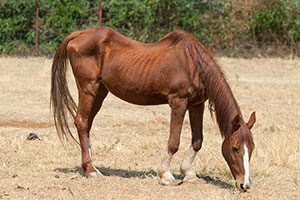A forensic entomologist has been called to testify in an aggravated animal cruelty trial in Orange County, New York.
Animal Abuse
On July 29, the Hudson Valley Society for the Prevention of Cruelty to Animals and the Town of Goshen conducted a raid on a Goshen farm in response to a complaint. They found the remains of ten horses and one severely undernourished stallion. The investigators also found ten live horses that were of normal weight, but had hooves in terrible condition. The Hudson Valley SPCA’s chief of humane law enforcement, Gene Hecht, said that it was “without a doubt” that the horses found on the property had died of starvation because there “wasn’t a drop of feed” on the property and the only hay they found was moldy and inedible.
The surviving malnourished horse, Seamus, was taken to Pony Tails Rescue in Honesdale, Pennsylvania. Lorie Brinkworth, a 25-year horse trainer and racetrack assistant veterinarian from Pony Tails Rescue described Seamus’ condition. She said, “His backbone was sticking up with protruding hip bones and rib cage clearly visible.” Brinkworth said that Seamus’ teeth were dark and discolored and his molars had sharp edges that prevented him from eating. Brinkworth said that Seamus’ breath smelled of manure and he actually ate his own manure for three weeks after arriving at the rescue.
The owner of the Goshen farm, Jeanne Ryan, is facing felony charges in connection with starving her horses to death. Prosecutors claim that Ryan kept her horses confined without enough food and water. Ryan faces 10 counts of felony aggravated animal cruelty and 10 misdemeanor cruelty. Ryan is a former NYPD officer. She faces up to one year in jail.
The Trial
Ryan’s attorney, Michael Sussman, argues that Ryan’s son, James McSwigin, had agreed to care for the horses, but had failed to do so. McSwigin acknowledged that he received multiple texts from his mother in February 2017 that told him to give the horses food and water. James McSwigin’s fiance, Erika Pohja, testified that McSwigin let his mother know that the horses were getting skinny, but Ryan told him that she could make the hay stretch and sell some of the horses.
The prosecution called Dr. Jennifer Rosati, a forensic entomologist, to testify at trial. Dr. Rosati examined the insects that were found near and on the horse carcasses. Rosati testified that she found pupal casings from three different species of blowflies in one of the barn stalls. Pupal casings are what is left behind when developed larvae become flies. Rosati took into account the life cycles of blowflies, weather conditions, seasons, and the advanced state of decay of the horses to determine that the blowflies laid their eggs between April 26, 2017 and June 10, 2017. Rosati was also able to determine that one of the horses died wearing a bridle.
Under questioning by prosecution, Rosati confirmed that the evidence that she found was consistent with the horses dying in late 2016 and being left in the barn. On cross-examination, Rosati stated that the horses could have also died as late as March 2017.




